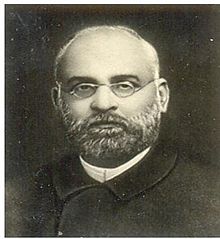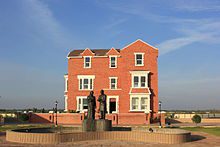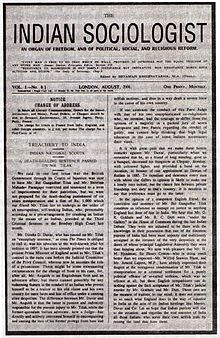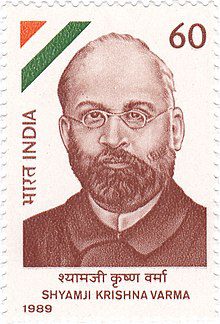When we talk about the role of migrant Indians and their contribution to the freedom struggle the first name that struck every mind is Mahatma Gandhi. To remember the contribution of Mahatma Gandhi in the freedom struggle we celebrate 9 January as Pravasi Bharatiya Diwas (once every two years) as on this day Mahatma Gandhi returned from South Africa in 1915.

Image Source: Wikipedia
But there was another migrant Indian who followed a completely different path for the cause of India’s freedom. While Gandhiji believed in nonviolence, this freedom fighter followed the path of eradicating the rule of injustice through violent means.
His name was Shyamji Krishna Varma, who was the founder of India House, India Sociologists, and the Indian Home Rule Society.
While the name of Mahatma Gandhiji is well remembered, but the name of Shyamji Krishna Varma had been forgotten. This is the short story of his achievement, which promoted the sense of nationalism among the Indian youth both in India and abroad. Even Gandhiji met him for political discussions.
Content
Background: Early Life of Shyamji Krishna Varma
Shyamji Krishna Varma was born on 4 October 1857 in the princely state of Kutch (Gujarat). His father (Krushnadas) was a laborer. His mother (Gomatibai) died when Varma was only 11 years old.
Shyamji Varma completed his graduation from Balliol College (England) and later worked as a Diwan of Junagadh. He was a journalist, scholar, lawyer who later became a freedom fighter.
Involvement in the freedom struggle
Varma was well aware of the situation of India and Indians. The British Raj had already become infamous for the peasants, workers, and nationalists. The decision like the Partition of Bengal on a communal basis and several other decisions boosted the activities of revolutionaries and Shyamji Varma took full advantage of it. The Swadeshi Movement also found its momentum during this period.
India House
Bal Gangadhar Tilak sent Shyamji Krishna Varma to England for the propagation of nationalism among Indians living abroad. Shyamji Krishna Varma opposed the moderate way of working of INC (Indian National Congress). He wholeheartedly supported the use of arms and violence against the British Raj to attain freedom.

Image Source: Wikipedia
The Russian Revolution of 1905 gave Varma the idea of conducting a nationwide revolution against the Raj.
He drew his inspiration from nationalist leaders and reformists like B.G.Tilak, Dayanand Saraswati, and Herbert Spencer (a renowned philosopher of the 19th century). In the year of 1905, Shyamji Krishna Varma laid the foundation of the INDIA HOUSE in London.
Later the same India House became a meeting place for all the Indian Revolutionaries. Due to the formation of India House, the nationalist Indian revolutionaries planned to throw the British Raj from Britain.
Eminent personalities like B.G.Tilak, Lala Lajpat Rai, and Madam Bhikaji Cama which later became the leader of the nationalist movement attended the inauguration ceremony of the Indian House in London. During the inauguration, Henry Hyndman (British writer and politician) said that looking towards the present situation loyalty towards the British will betray the Indians.
Later leaders like Mahatma Gandhi, Vladimir Lenin, B.G.Tilak, Lala Lajpat Rai, Gopal Krishna Gokhale, Bipin Chandra Pal also met with Varma for political discussion. Nationalist leaders like V.D.Savarkar, Bhikaji Cama, Lala Hardayal, Tirumal Acharya, VVS Aiyar, Virendranath Chattopadhyaya, S.R.Rana, etc. drew much of their inspiration from the India House.
Indian Sociologists
Later he also launched a monthly newspaper called The Indian Sociologist whose primary aim was to expose the British Raj and its oppressive rule. Furthermore, it also emphasizes gathering the support of the young Indians both in India and in England.

The newspaper of Shyamji Krishna Varma was published to expose British policies.
Note: On 11 November 2015 the above mention decision was accepted as a miscarriage of justice and revoked.
In February of 1905, Varma founded the Indian Home Rule Society to
1 Establish Home Rule in India
3 To spread the idea of nationalism and national unity among the young students who were pursuing their education in England.
The work done by Shyamji Varma in the field of Home Rule greatly influenced the youth and in the year 1906, 119 members joined the movement. This society held regular meetings on creating an anti-British sentiment among the youth. They also emphasized circulating various articles and pamphlets of revolution.

In the year of 1907, Varma gave the leadership of the India House to V.D.Savarkar and left for Paris. When Savarkar was arrested in the Nasik Conspiracy he wrote an article on Daily Herald whose title was Savarkar the Hindu Patriot whose sentence expires on 24 December 1960.
Later the relation between Britain and France stabilized due to the 1st world war and due to this Varma again shifted his base from Paris to Geneva in Switzerland. Varma passed his last days in Switzerland and died on 30 March 1930.
LIKE WHAT WE ARE DOING? DONATE TO DHARMAYUDH
If you support what we are doing and would like to contribute to help us grow and reach more Indians to teach them more about such forgotten historic Indian Heroes and stories, please consider donating any amount. It will help us grow.
